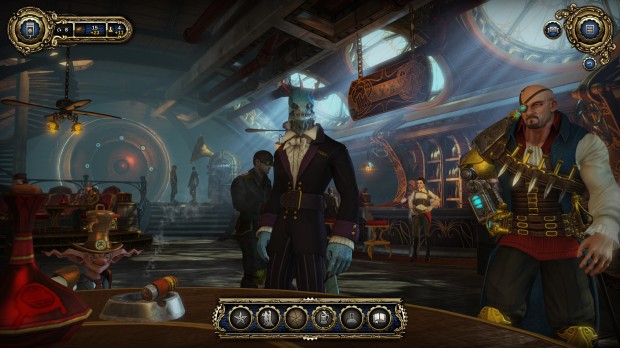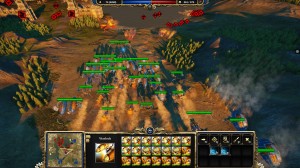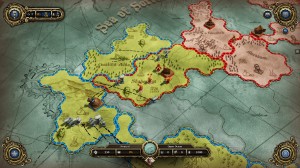Divinity: Dragon Commander Review (PC)
- Updated: 20th Aug, 2013

When I saw the trailer video for Divinity: Dragon Commander from Larian Studios I was both sceptical and hopeful. The game covers a lot of bases and it’s a tall order for any developer to be able to faithfully represent each one. Dragon Commander tries it’s best and falls a little short. It’s a Risk board and RTS in one, based around you fighting your half-siblings in competition for the throne of the empire which they have just destroyed your father to obtain. This story is pretty standard although it’s almost the only tutorial you get, and that’s pretty sparse.
The strategic map revolves around you manufacturing, transporting and utilising units to occupy territory. In those territories you then build or discover buildings that provide extra gold, game cards or research points. Game cards are used to influence either the strategic or tactical game by various methods. Once your troops enter a region on the strategic map with a managed opposition, you then have the option of the tactical map to enter and dictate the battle, or you can spend gold on hiring one of you attendant generals to dictate it for you.
This is not particularly complicated, although the tutorial is a bit thin on details and then disappears. The voices of your advisors quickly annoy but you can always read the text plates quickly and move on, and the effect of the choices you make are very clearly signposted, which allows you to, for example, fully understand the repercussions of adopting the elvishly unpopular conscription when you start off fighting mostly in the elven lands. The research part of the game allows you a plethora of choices to tailor your units and add new machines to your factories and I found that several run-throughs were required before I developed the early game setup that suited me most.
The result of this maneuvering and card dealing, the tactical game, is the core of Dragon Commander. You start each battle with a small compound containing the bases for a factory and a recruitment centre. Whatever units you had involved in the region are represented, plus whatever mercenaries or ancillaries you receive from played cards are all present in the base and also various possible effects on the enemy, immobile units and slow firing ones, that kind of thing.
And then the game turns into a frantic rush for ownership of the pre-placed factory and recruitment bases that are dotted around the map. Acquisition of the recruitment shaped bases is vital because there is a finite amount of willing people available to join up for either side and the rush to provide crews for your machinery is your early priority. The more recruitment centres you build, the faster people join your side. With you both competing for the same volunteers, getting an early lead can be vital. And here my problem with this game peaks.
 The tactical game has some pretty big flaws; it’s heavily zerg orientated, you can lose the game in the first minute and the units operate on a hierarchical rock/paper/scissors of endless proportion. The cheap trooper is powerful against light units, but butchered by armours. The armours are weak against air units, but the air units are weak against grenadiers. You get the point. Troopers can also convert buildings to their side really quickly, which makes building turrets a dangerous game. Woe to the general who has built the weaker set of units to zerg to the other side with. Crews won’t be replaced easily and defence points won’t hold off the counter-attack from the little pre-placed turret bases.
The tactical game has some pretty big flaws; it’s heavily zerg orientated, you can lose the game in the first minute and the units operate on a hierarchical rock/paper/scissors of endless proportion. The cheap trooper is powerful against light units, but butchered by armours. The armours are weak against air units, but the air units are weak against grenadiers. You get the point. Troopers can also convert buildings to their side really quickly, which makes building turrets a dangerous game. Woe to the general who has built the weaker set of units to zerg to the other side with. Crews won’t be replaced easily and defence points won’t hold off the counter-attack from the little pre-placed turret bases.
You also, due to your half dragon ancestry, have the capability of turning into the dragon commander of the title, flying around raining fire on the enemy for the few brief seconds you are allowed before a hail of anti-air fire and homing missiles bring you down. Sometimes you can sway the battle, sometimes you just spit out a little fire before you go down. In multiplayer the game almost devolves into you just chasing each other around fighting dragon e dragon, and that’s actually the best bit of the game in my opinion, although not going very far to resolving the battle map.
 In summary, this game has great potential but is let down by the balance and speed of the RTS element. It could be a complex and deep game, but the shuddering desire to avoid having to face another RTS battle that grew in me as my empire spread is not something a game should wish to foster in the player. There are good elements, and some clever functions, but this is a game to buy on the cheap and discover your own slight disappointment with it.
In summary, this game has great potential but is let down by the balance and speed of the RTS element. It could be a complex and deep game, but the shuddering desire to avoid having to face another RTS battle that grew in me as my empire spread is not something a game should wish to foster in the player. There are good elements, and some clever functions, but this is a game to buy on the cheap and discover your own slight disappointment with it.


Follow Us!